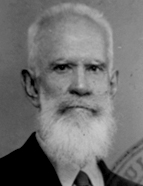

His interest in the Americas naturally extended to the intertwined histories of Spain and Portugal, particularly during the colonial era in America. These intellectual inclinations led him, in 1895, to establish the Revista Crítica de Historia y Literatura Españolas, Portuguesas e Hispano-Americanas [Critical Journal of Spanish, Portuguese, and Spanish-American History and Literature], and later, he collaborated on the Anuario legislativo Hispano-Portugués-Americano [Hispano-Portuguese-American Legislative Yearbook]. The time he spent in Portugal in 1944 enabled him to rekindle old relationships and produce several publications, among which his work Cartas de hombres 1927-1941 [Letters from Men 1927–1941] stands out (Lisbon, Livraria Luso-Espanhola, 1944). The background to his article Autonomía y descentralización legislativa en el régimen colonial español. Legislación metropolitana y legislación propiamente indiana. (Siglos XVI a XVIII) [Autonomy and Legislative Decentralisation in the Spanish Colonial Regime: Metropolitan Legislation and Legislation Specifically for the Indies (16th to 18th Centuries)] is also dated 1944, and was published in the Boletim da Faculdade de Direito da Universidade de Coimbra [Bulletin of the Faculty of Law of the University of Coimbra] in 1945. Later, during his years of exile in the Americas, he continued collaborating with Portuguese individuals and institutions, publishing his work La extraña historia de la recopilación de Antonio de León Pinelo [The Strange History of Antonio de León Pinelo’s Compilation] in the aforementioned Boletim da Faculdade de Direito da Universidade de Coimbra . He eventually managed to secure passage to the United States after receiving an invitation from Columbia University (New York) to deliver a course. However, this plan did not come to fruition, and instead he travelled to Mexico, entering the country in November 1944 as a political refugee, invited by the Secretariat of Public Education. On 16 April 1945, he began his collaboration with the Universidad Nacional Autónoma de México [National Autonomous University of Mexico] (UNAM), joining the Facultad de Filosofía y Letras [Faculty of Philosophy and Philology] in the History department, where he taught the History of Spanish Civilisation. At El Colegio de México [The College of Mexico], he was appointed to the chair and seminar of Preparación para las investigaciones históricas [Preparation for Historical Research] (i.e. Técnica de la Historia humana [Techniques of Human History]). Exile provided him with a fresh opportunity for intellectual creation and allowed him to immerse himself in research. Although the working conditions were less than ideal — due to his age, lack of resources, and the anxiety stemming from his situation — the results were nonetheless remarkable. During these years, he worked on memoirs and reflections on the human condition, the methodology of the Laws of the Indies, and definitive editions of his earlier works (“Estudio preliminar”, 1988, p. 17).
This work is financed by national funds through FCT - Foundation for Science and Technology, I.P, in the scope of the projects UIDB/04311/2020 and UIDP/04311/2020.
